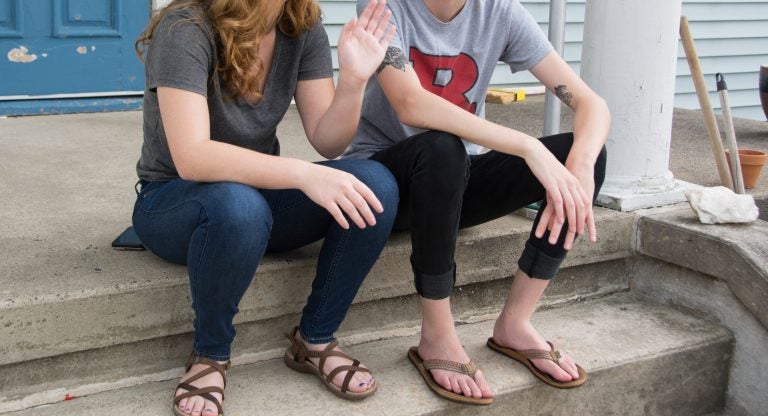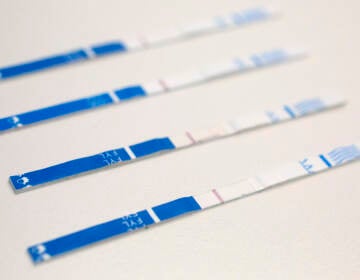How Rutgers became a national model for helping student addicts in recovery
Listen 5:31
Two students sit on the front porch at one of the three "sober dorms" for student addicts in recovery at Rutgers University’s campus in New Brunswick. (Danielle Fox for WHYY)
“More colleges and universities are creating sober living programs for student addicts in recovery, and many are using the blueprint Rutgers University created nearly 30 years ago.”
When you think of college dorms, rowdy parties, red Solo cups, and the thick stench of pot might come to mind. But for student addicts in recovery, the often easy access to drugs and alcohol can be challenging.
As the opioid crisis has intensified in the U.S., more colleges and universities have been turning to sober-living programs to help these students stay sober and graduate. Many of them are using the blueprint Rutgers University created nearly 30 years ago.
Last year, Lisa moved into one of the three recovery houses on Rutgers’ New Brunswick campus. (We’re withholding her last name to so she can speak honestly about her addiction without compromising her efforts to get her degree and find a job.)
The house is a light-blue Colonial with white pillars and a small front porch. It blends in with other houses on campus, but Lisa and other students who live there say it’s not the stereotypical dorm experience — and that’s all right with them.
“I just think that if I was in a regular college dorm, I would just be sitting in my room all sad because I’m not going to go out with you if you’re getting drunk,” she said.
Ready to start sophomore year, Lisa leans back into her living room sofa, looking forward to when the rest of the couches and chairs will be packed come basketball season.
“It’s like a party in here, it really is,” she said. “It’s just awesome to be able to have so many friends and, like, you’re all sober, and it’s just a lot of fun.”
Lisa started smoking pot when she was 14 and her life quickly began to revolve around drinking and doing drugs. After she got sober at 16, she said she realized she had to make staying sober a priority. She transferred to the Raymond J. Lesniak Recovery High School in New Jersey, and, when it was time to look at colleges, she wanted to find a program that would help her continue her recovery.
After visiting the Rutgers recovery house, she knew it was the right fit. But when she started college, the transition was difficult, and she found it hard to balance staying sober with more demanding college classes.
But Lisa said living in the house makes it easier because she’s not alone.
“I’m surrounded by people all the time that are like me and that understand me,” she said. “And you know other people are going to keep you accountable just because they know exactly what you’re going through.”
Almost 30 years old, the Rutgers recovery house was the first of its kind in the country.
Lisa Laitman is the director of the Alcohol and Other Drug Assistance Program for Rutgers New Brunswick — or, as some of her students like to call her, “the godmother.” She built the recovery program from the ground up.
In 1983, Rutgers hired her as an alcohol counselor after an intoxicated student fell off the football stadium bleachers and was paralyzed. She was the only counselor for all three Rutgers campuses, which added up to more than 50,000 students. And she felt the university was in the dark about the resources needed to run a successful recovery program.
Within a year, she convinced the university to hire another counselor. Soon after that, Laitman started running a recovery group, which became the place to be on Thursday nights. A lot of her students were anxious about dorm parties and felt lonely watching their roommates getting ready to go out.
She had an idea: What if her students could live together in a recovery house? But when she pitched it to them, they were skeptical.
“One kid finally said, ‘I could just imagine a building with a big sign that said ‘drunk floor’ on it.’ And I said, ‘Well, that’s not hard, we just make it anonymous,’ ” Laitman remembers.
‘It keeps me sober’
Chris (whose last name we’re also withholding) moved into the Rutgers recovery house two decades ago. He has been sober for 22 years and has remained close to his roommates.
He said the anonymity of the house was comforting, allowing him and his friends to be themselves.
“Whether it was road trips or concerts or a late night out, we had the ability to be regular kids and not some weird outcast group that isn’t partying,” he said.
Chris said he also appreciated having a say in how the place ran.
“[The staff] were willing to listen to us and to sometimes not listen to us, which was probably pretty smart,” he laughed.
That’s changed over the years, Laitman said.
“What we’ve learned over time is that the best community is one where there’s a lot of checks and balances,” she said.
For example, recovery counselors don’t conduct routine drug tests unless residents are concerned one of their peers is using.
“When the community feels there’s something going on, we have the right to do drug testing and that’s a balancing act,” Laitman said. “Some of the students in our community have years of sobriety, and so drug testing everybody routinely feels insulting, and it really isn’t what the community is about.”
Students also feel a responsibility to support and hold each other accountable.
Two weeks into Claire’s first semester at Rutgers, she was arrested and went to rehab for problems with drugs and alcohol. (We’re also withholding her last name.)
When she got back to campus, she moved into the recovery house. At first, Claire was nervous. But now, she feels like she has a purpose helping her friends stay on track.
“I’ve just grown tremendously in my recovery,” she said. “I go to meetings. I help people out. I chair a meeting. I talk to newcomers. I do a lot of stuff because it keeps me sober, and it keeps them sober.”
N.J. requires some state schools to provide recovery housing
Five years ago, Laitman was on the New Jersey Division of Addiction Services Strategic Prevention Committee, which found that 18- to 25-year-olds are at the highest risk of having problems with substance use.
“This opioid epidemic has only reinforced some of that,” she said.
In response, New Jersey passed a law in 2015 requiring state schools to provide recovery housing if at least one-quarter of students live on campus. Now halfway to the 2019 deadline, four of the six colleges and universities have created sober-living programs. And many are emailing and Skyping with Laitman for advice.
She said college programs are some of the best-kept secrets around because they have low relapse rates and high GPAs. At Rutgers New Brunswick, the average GPA for students in recovery housing is a 3.2 and 94 percent of them have stayed sober.
“Ever since I’ve been in the field, which has been 40 years, I’ve been told young people need more support,” Laitman said. “You can’t just send a young person to a 30-day rehab and expect them to get better. We need to develop interventions like recovery high schools or collegiate recovery programs that help young people who got out of a treatment program to keep moving along with their lives.”
In January, Rutgers New Brunswick is doubling the capacity of its recovery housing program. New and current students will move into a brand-new apartment building with space for 40 residents.
Every year, around 15 students in the New Brunswick recovery community graduate.
Claire said seeing her friends walk across the stage in their caps and gowns last year is a moment that continues to motivate her.
“It kind of just makes me feel like you can have fun without drugs and alcohol, and you can live life normally without them either,” she said.
The first semester of college, Claire says she didn’t crack open a book. Now she’s a math major, and she’s looking forward to a lot. Mentoring new students in the house, graduating and continuing her recovery are all part of the equation.
WHYY is your source for fact-based, in-depth journalism and information. As a nonprofit organization, we rely on financial support from readers like you. Please give today.





